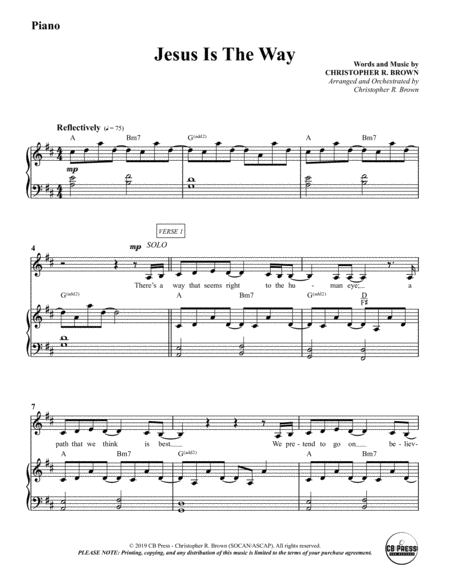Choral Choir (SATB) - Level 3 - Digital Download SKU: A0.747199 Composed by Christopher R. Brown. Christian,Gospel,Praise & Worship,Sacred. Octavo. 9 pages. Christopher Brown #4628111. Published by Christopher Brown (A0.747199). About the song: In John 14, Jesus says, I am the way, the truth and the life. No one comes to the Father except through me. We are severely mistaken if we think that any other road leads to peace with God. No amount of good deeds could pay for the debt we owe. But we are also mistaken if we think that we are too far gone from Christ's reach. This song is a message for both the self-righteous and the hopeless. There is a Way that leads to life forevermore with our Heavenly Father, and His Name is Jesus Christ. All who enter through the gate of Christ by faith will be saved. He came that you might have life, and have it to the full. Rejoice! If you can believe, believe!Can be performed with piano accompaniment only, OR with additional band members, OR with full orchestra*.Please Note:You can purchase individual copies of the choral score separately on Sheet Music Plus. Performance of this piece requires the purchase of one choral score per singer.*Full orchestration and parts also available on Sheet Music Plus.Included in your Purchase:Piano AccompanimentLyrics:Verse 1There’s a way that seems right to the human eye,A path that we think is best.We pretend to go on believing,That a good life can pass the test.But the best that we have to offer,Is no more than a filthy rag.When we stand before God, the Father,There is only one Name that will save.Chorus 1Jesus is The Way,Jesus is The Truth,Jesus is The Life for me and you.Jesus is The Door,And all who enter through,Will be saved and be made new.Jesus is The Way.Verse 2We were shackled in chains of sin and shame,Walking blinded by selfish gain.Every turn led to disappointment,Wanting more with each passing day.Prechorus 2But the blood of a precious Saviour,Can remove every guilty stain.He will carry your ev’ry burden,There is hope in Him today!Chorus 2Jesus is The Way,Jesus is The Truth,Jesus is The Life for me and you.Jesus is The Door,And all who enter through,Will be saved and be made new.Jesus is The Way,Jesus is The Way.BridgeStraight and narrow is the road that leads to life forevermore,There’s only One Who paid the price,The perfect, spotless sacrifice,Only Jesus Christ!Chorus 3Jesus is The Way,Jesus is The Truth,Jesus is The Life for me and you.Jesus is The Door,And all who enter through,Will be saved and be made new.Jesus is The Way,Jesus is The Way,Jesus is The Way!
